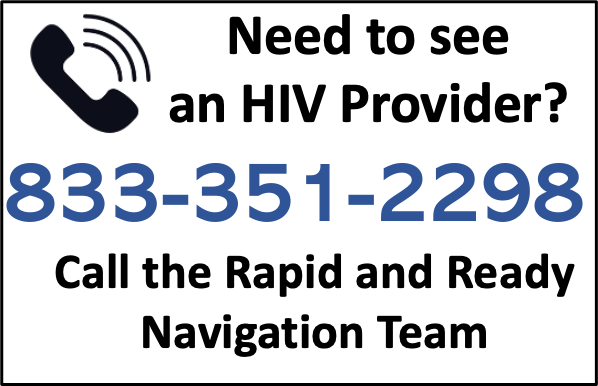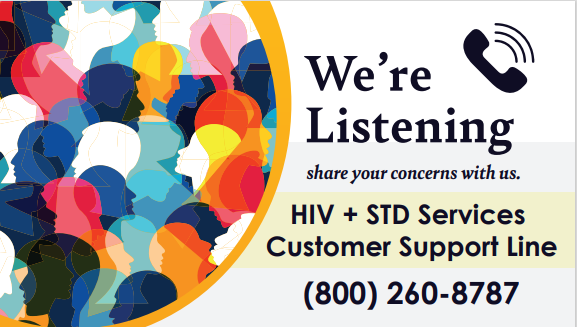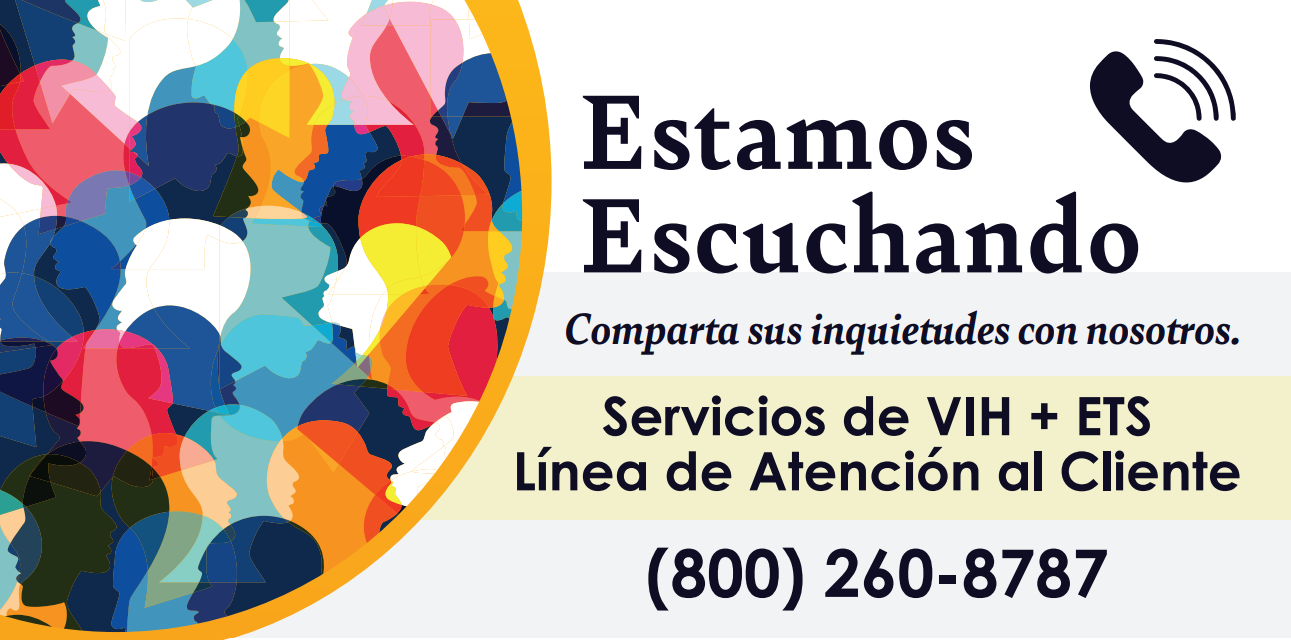|
Community and Provider Information and Resources
|
Los Angeles County Department of Public Health
Division of HIV and STD Programs
Gas Company Tower
555 W. 5th Street, 34th Floor
Los Angeles, CA 90013
Phone:(213) 351-8000
Fax: (213) 738-0825
Email: DHSP@ph.lacounty.gov
Office Hrs: 8 a.m.-5 p.m. M-F
|
|
Social Marketing Campaigns |
|
|
Health Content and Privacy Info |
|
|
| PrEP Information for Patients |
What is
PrEP?
PrEP - The Basics
-
Consider PrEP.
PrEP is for HIV-negative people who are at risk of
being exposed to HIV through sex or injecting drugs
and who are ready to take a daily pill.
-
Talk to Your Doctor.
You need to speak with a doctor or nurse before you
start using PrEP. Your doctor or nurse can help you
decide if PrEP is right for you. These clinics
can help you get PrEP.
-
Take PrEP Every Day.
PrEP is taken daily in pill form. Do
not skip
a dose. PrEP works much better at stopping HIV if
you take it every
day.
-
Use Condoms. Even
if you take PrEP daily, condoms give
you additional protection against HIV, other
sexually transmitted infections, and unintended
pregnancy.
-
Know the Common Side Effects. PrEP
can have mild side effects, like stomach pain,
weight loss and headaches, especially at the
beginning of treatment. PrEP may not be right for
everyone. Talk to your doctor.
-
Find Out about
Paying for PrEP. Many
insurance plans including Medi-cal cover PrEP. Assistance
may be available if you are uninsured.
-
Know about PEP. PrEP
is not an emergency medication. If you think you
were recently exposed to HIV, you may need emergency
PEP.
How does PrEP stop HIV?
-
PrEP contains the same medicines that people with HIV
use to stay healthy. If you are exposed to HIV, these
medicines can stop the virus from multiplying and
spreading throughout your body. PrEP only works if you
have enough medicine in your body, so you need to take
PrEP every day.
Should I consider taking PrEP?
-
PrEP is for people who are HIV-negative, have a high
risk of being exposed to HIV through sex or drug
injection, and are ready to take a daily pill.
-
Studies have shown that
PrEP works for sexually-active gay and bisexual men,
heterosexual women and men, and injection drug users,
and is also likely to benefit transgender women. PrEP
can help protect anyone whose partner has HIV.
How do I take PrEP?
-
PrEP is prescribed by a doctor or nurse. You should take
PrEP exactly as prescribed. With PrEP, you take a pill
once a day, even on the days you dont have sex or
inject drugs.
-
The only medication currently approved for PrEP is
TruvadaŽ, a combination pill that contains two different
medicines: emtricitabine (EmtrivaŽ) and tenofovir (VireadŽ).
-
PrEP only works if you are HIV-negative.
Before you start PrEP, you
will take an HIV test to make sure that
you do not have HIV. You also have a check-up to
make sure your kidneys and liver are healthy.
-
While you are on
PrEP, your doctor or nurse will test you
regularly for HIV and other sexually transmitted
infections. They will also ask you about your HIV
risk and whether you are taking PrEP every day.
-
PrEP can help you stay HIV-negative when your risk of
HIV exposure is high. You may decide to stop taking this
medication if your risk changes. But do not stop taking
PrEP without first talking to your doctor. Also, tell
your doctor if you are thinking about becoming pregnant
or if you become pregnant while on PrEP.
Is PrEP safe? What are the side effects?
-
PrEP is safe. The pill used for PrEP, TruvadaŽ, has been
used to treat people with HIV since 2004.
-
PrEP can cause mild side effects, including upset
stomach, headaches and weight loss, especially at
the beginning of treatment. Rare side effects
include kidney or bone problems. Your doctor or
nurse can help if side effects are bothering you.
How well does PrEP work?
-
PrEP is not 100% effective. You can still get HIV,
especially if you do not have not enough medicine in
your body. In different
studies, people taking PrEP were 44% to 75% less
likely to get HIV than comparison groups, and people who
took PrEP consistently were up to 92% less likely to get
HIV.
Can I take PrEP only on the days when I have sex?
If I take PrEP, do I still have to use condoms?
-
PrEP does not provide 100% protection against HIV.
Condoms provide additional protection against HIV, even
while you take PrEP. Condoms also protect against other
sexually transmitted infections and prevent unintended
pregnancy.
-
For greater protection against HIV, combine PrEP
with other ways to reduce HIV risk:
-
Use condoms.
-
Choose kinds of sex with less risk of spreading HIV,
like oral sex.
-
Get tested with
your partners for HIV and other sexually transmitted
infections.
-
Encourage partners living with HIV to take
their HIV medications every day.
-
If alcohol or drugs are a problem, get
help.
-
If you inject drugs, always use
a clean syringe.
Where Can I Get PrEP in Los Angeles County?
How do I pay for PrEP?
-
In L.A. County, PrEP is covered by Medi-Cal and many
private health insurance and prescription plans.
-
If you do not have health insurance, you may be eligible
for a patient assistance program to help uninsured
patients pay for PrEP. Your doctor or nurse can help you
apply.
How else can I stay HIV-negative?
-
Use Condoms.
Find
the size and type of condom you
like. Condoms are available for
free in L.A. County .
-
Use Lube. Use
water-based or silicone-based
lubricant, especially during anal
sex.
-
Get Tested. Its
the only way to know if you or a
partner has HIV.
-
Get Checked
for Other Sexually Transmitted
Infections. STIs
can make it easier to get or spread
HIV.
-
Talk to Your
Partners About Testing. Ask
your sex partners about the last
time they had an HIV test. To be
sure, get tested together.
-
Support Your
Partners Living With HIV. If
your partner is living with HIV,
encourage him or her to get HIV care
and take his or her medications
every day. This will help your
partner stay healthy and reduce his
or her chance of passing HIV to you.
-
Avoid Alcohol
and Drugs When You Have Sex. Drinking
or getting high when you have sex
can make it hard to remember to use
condoms. For help to stop using,
call 800-LIFENET (800-543-3638).
-
Use Clean
Syringes. If
you inject drugs, and are not ready
to stop, use a new, clean syringe
every time. Clean syringes are
available for free all over New York
City.
-
Know About
Emergency PEP. If
you are not taking PrEP and think
you were recently exposed to HIV, go
immediately to
your doctor or an emergency room and
ask for PEP, an emergency medication
that can prevent HIV.
|
What
is a High-risk HIV Exposure?
How do I Find PEP/PrEP in Los Angeles
County?
-
Talk to your regular doctor or nurse or visit one of the
many clinics
with experience providing PrEP in
LA County.
-
For more
information call the LA County PrEP warmline - (213)
351-7699
-
The Los
Angeles Gay and Lesbian Center in Hollywood - (323)
860-5855 (Option 4)
|
|
|
Report an HIV or STD Case |
|

Call (800) 260-8787
|
|
Get Screened and Treated for HIV and STDs |


Pocket Guide LA provides list of STD/HIV Services for Youth in Los Angeles County



|
|
|
|